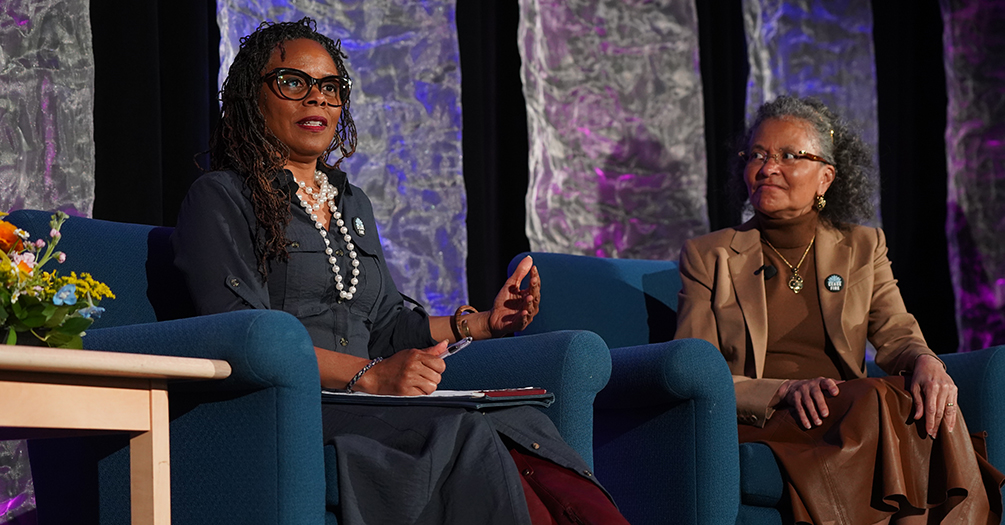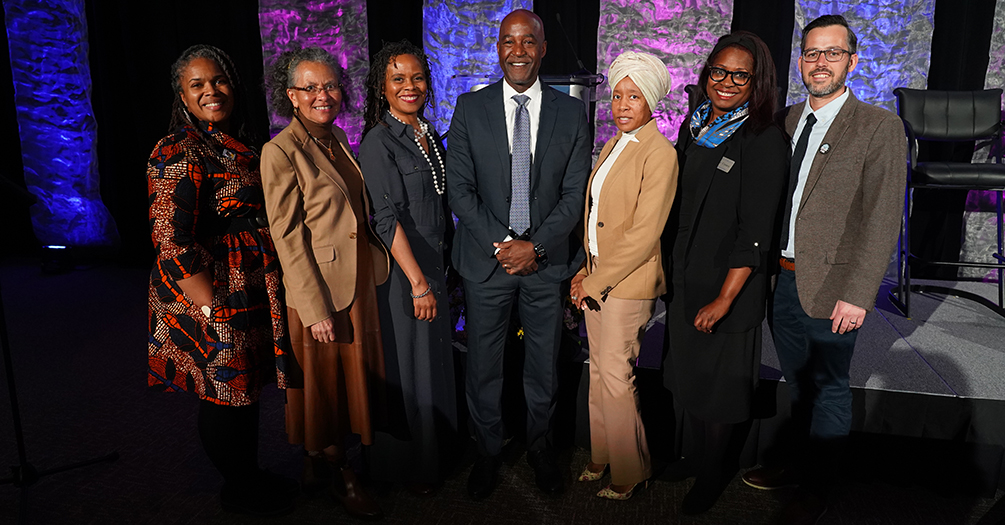Historic conversation on health equity, anti-racism highlights DEI symposium

ANN ARBOR—The University of Michigan School of Public Health Office for Diversity, Equity and Inclusion, in partnership with several groups across campus, hosted the seminar “We make the road by walking: A symposium on advancing a health equity movement,” a daylong gathering focused on health equity, anti-racism and the health sciences.
The symposium, held April 2 at the Palmer Commons Great Lakes Room, was based on the groundbreaking work of Dr. Camara Phyllis Jones and Dr. Chandra Ford, international thought leaders in anti-racism and health, who participated in a keynote conversation moderated by Michigan Public Health alumna Laprisha Berry Daniels, MPH ’05. It marked the first public conversation between the scholars.
“Across the many disciplines within the health sciences, we achieve success when we support the health and well-being of people, neighborhoods and communities,” said F. DuBois Bowman, dean of Michigan Public Health. “We can’t do that without addressing health inequities. Health equity is such a critical topic, and I’m proud of the collaboration at the University of Michigan that has allowed us to bring this symposium to campus.
“I’m honored that we’re hosting Dr. Camara Phyllis Jones and Dr. Chandra Ford for this important conversation.”
The discussion between Jones and Ford repeatedly underscored the importance of health equity as a pivotal concern within public health. Achieving health equity requires intentional and collective action that focuses on understanding and addressing the underlying causes of health inequities.
Jones, a family physician and epidemiologist whose work focuses on naming, measuring and addressing the impacts of racism on the health and well-being of the nation, explained the multi-level nature of racism, discussing institutionalized, personally mediated and internalized racism. She said that addressing racism directly leads to better, more equitable outcomes for everyone, not just those typically disadvantaged by racism.
Racism is a system of structuring opportunity and assigning value based on the social interpretation of how one looks—which is what we call ‘race’—that unfairly disadvantages some individuals and communities, unfairly advantages other individuals and communities, and saps the strength of the whole society through the waste of human resources.”
— Dr. Camara Phyllis Jones
She serves as a commissioner on the O’Neill-Lancet Commission on Racism, Structural Discrimination, and Global Health, and is a past president of the American Public Health Association, a senior fellow at the Morehouse School of Medicine, and an adjunct professor at the Rollins School of Public Health at Emory University.
“Racism is a system of structuring opportunity and assigning value based on the social interpretation of how one looks—which is what we call ‘race’—that unfairly disadvantages some individuals and communities, unfairly advantages other individuals and communities, and saps the strength of the whole society through the waste of human resources,” Jones said.
Ford is a professor at the Rollins School of Public Health at Emory University and the Department of African American Studies and the founding director of the Center for the Study of Racism, Social Justice & Health.
She encouraged reflection on how racism is operating in contemporary contexts and the public health professional’s role in documenting, naming and taking action against racism. This includes addressing evolving forms of racism and considering the broad professional and ethical responsibilities public health professionals have in the face of global crises influenced by racism.
“Racism is the state-sanctioned as well as the extra-legal production and exploitation of group-differentiated vulnerability to premature death,” said Ford, who co-created the Public Health Critical Race Praxis, a framework for applying critical race theory to public health research.
A recurring theme throughout the discussion was the necessity to name, understand and intentionally combat racism at all levels—institutional, personal and internalized. The speakers emphasized that racism not only harms the targeted groups but the whole society by wasting valuable human resources and inhibiting collective progress.
Jones emphasized the need for long-term commitment and generational impact in efforts to address inequality. Well known for her use of allegory in discussing racism, she used a metaphor of flowers and soil to describe appropriate interventions for systemic racism.
“Racism is the state-sanctioned as well as the extra-legal production and exploitation of group-differentiated vulnerability to premature death.”
— Dr. Chandra Ford
“If we’re going to put on our urgent action agenda addressing the differences between the height and vigor of the pink and red flowers and we now know it’s due to the soil, then what will we do? We’re going to enrich that poor, rocky soil today until it’s as rich as the rich fertile soil,” said Jones, pointing out that while immediate changes might be minor, the true results will manifest in the next generation when new seeds grow in the improved conditions.
Short-term assessments of progress might not reflect the full potential of the interventions, she said, and actions should be seen with a generational perspective beyond mere documentation or immediate outcomes. Jones urged that a deep, sustained approach is needed—one that looks past immediate research to embrace transformative action over time.
Ford compared naming racism to a strategic move in chess, suggesting a need to constantly adapt our understanding and approach to combating it.
“In today’s world, racism manifests differently than it did in the past, and simply naming it may inadvertently hide certain aspects of how it operates,” said Ford, expressing concern about recognizing and documenting these changing expressions of racism and emphasizing that while documentation is crucial, it’s insufficient by itself given racism’s fluid and dynamic character.
“The focus should be on identifying how racism transforms over time to effectively address and mitigate its impact on society and health outcomes.”
The symposium was sponsored by Michigan Public Health DEI, MShield, Racism Lab, the School of Pharmacy, Office of the Vice President for Research, Institute for Healthcare Policy and Innovation, and National Center for Institutional Diversity’s Anti-Racism Collaborative.

